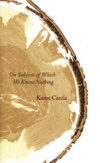On Subjects of Which We Know Nothing
As its name might suggest, Karen Carcia’s On Subjects of Which We Know Nothing explores the periphery of awareness: objects unseen, things unsaid, and events forgotten. Like a crooked tree, the chapbook depends upon what isn’t there as much as what is, achieving its own wholeness and balance.
As its name might suggest, Karen Carcia’s On Subjects of Which We Know Nothing explores the periphery of awareness: objects unseen, things unsaid, and events forgotten. Like a crooked tree, the chapbook depends upon what isn’t there as much as what is, achieving its own wholeness and balance.
The titular poem, for instance, hangs on “The Rest in Music,” a moment of silence which nonetheless takes up space and time and perhaps lends meaning to the surrounding tones. In “By Raincloud or Anvil,” a night is measured “by absence / like all matter / that matters”—an idea revisited in “Dear Remembered”: “As I write, my lamp erases part of the night. Well, erases my vision of it. . . Of course, we think of emptiness more as presence, don’t we? An absence so large it fills things up.” “Selection” calls attention to the gaps in the speaker’s memory. It starts, “When I begin to map it out, I already see / how I’ve left your house out.”
The poems—about 10 in all—are each accompanied by extensive footnotes. Some act academically, sharing quotes and scientific facts that explain or had influenced a line, while others serve as extensions of the original poetry. While other poets might play ironically in their use of footnotes, Carcia’s are genuine, with less flash and more substance, although they maintain a hint of playfulness as they self-refer to other poems and their notes, or call up false mathematical equations.
The notes add layers of depth to poems that already plunged, and in doing so, further allude to absences in the primary text. On Subjects of Which We Know Nothing is a prime example of how, beyond the form of an individual poem (for Jack Spicer wrote, “A poem is never to be judged by itself alone”), the form of a collection of poems will follow its function.





